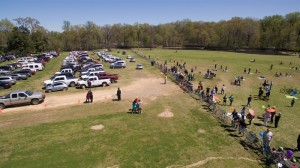 What’s wrong with this picture? You can be excused if you don’t immediately think, “no accessible parking,” but that might be the first thing that would come to mind for the defendant in Langer v. G.W. Properties, L.P., , 2016 WL 3419299, (S.D. Cal. June 21, 2016). Langer serves as a reminder that a business not usually covered by the ADA can become a “public accommodation” based on temporary use, and that this may lead to requirements for permanent changes. Commercial enterprises and apartment complexes should pay attention, as should any owner of raw land that allows it to be used for parking from time to time.
What’s wrong with this picture? You can be excused if you don’t immediately think, “no accessible parking,” but that might be the first thing that would come to mind for the defendant in Langer v. G.W. Properties, L.P., , 2016 WL 3419299, (S.D. Cal. June 21, 2016). Langer serves as a reminder that a business not usually covered by the ADA can become a “public accommodation” based on temporary use, and that this may lead to requirements for permanent changes. Commercial enterprises and apartment complexes should pay attention, as should any owner of raw land that allows it to be used for parking from time to time.
The primary defendant in Langer was a commercial print shop that had no public parking. The court seems to have assumed it was not a public accommodation although it would appear to be a “service establishment” as that term is used in 42 U.S.C. sec. 12181(7)(F). In any case, the owner, in order to make extra money, began allowing public parking during events at a nearby stadium. The disabled plaintiff tried to use the lot, found there was no accessible parking, and sued.
The bulk of the opinion discusses the doctrine of mootness, which is, when it works, the best possible defense to any ADA claim. In this case it did not work. The defendant asserted the claims were moot because it had decided never to allow the public to use the lot again, thus removing from the kinds of businesses regulated by Title III of the ADA. It isn’t hard to imagine the owner’s thought process. If opening the lot to the public caused the problem, then closing it should eliminate the problem. Unfortunately, public accommodation status is like a cold – it is easier to catch it than to get rid of it. After a useful (for lawyers) review of the cases on mootness the court concluded that it could not be sure the lot would remaining permanently off limits to the public. If switching between public accommodation and private parking was as easy as the owner’s change of mind then it would be easy enough for the owner to change his mind again.
Having lost the mootness argument it is fair to say the owner effectively lost the entire lawsuit. There was no dispute about the lack of accessible parking and the almost certain outcome is an order to create accessible parking, plus attorneys fees to the plaintiff and damages under California’s Unruh Act.
There is an important lesson here for businesses of all types. Do not believe that a temporary change in the direction of public accommodation can ever be reversed. If a small business starts allowing customers to use its restrooms then those restrooms are going to be facilities covered by the ADA and required to meet ADA standards. Going back to private use only may not be something a court will accept. If a business allows after hours use of its otherwise private parking lot that lot may become a public accommodation that must meed ADA standards. If your homeowners association decides to let the local swim team use the pool, that pool may become now subject to the ADA. The same with tennis courts and other common areas that might ordinarily be covered only by the much less stringent requirements of the FHA. And of course this warning applies to apartments as well. (By the way, it doesn’t matter if the use is free. Nothing about the definition of public accommodation requires that there be a profit motive. The ADA will punish those who attempt to do good but don’t do it in the way the ADA requires.)
Chambers of commerce and other organizations that help businesses, especially small businesses, need to help their members understand that almost all public facing operations of a business have ADA implications. It may be physical access, but it can also be issues of customer service and, of course, the internet. Most important, as Langer illustrates, some decisions about temporary use can turn into permanent problems, and the ADA implications need to be carefully considered in advance.

